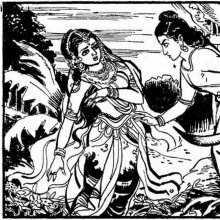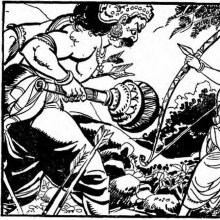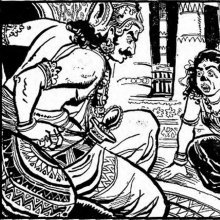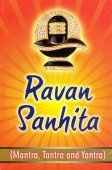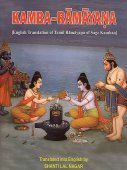Shurpanakha, Surpanakha, Śūrpaṇakhā, Shurpa-nakha: 21 definitions
Introduction:
Shurpanakha means something in Hinduism, Sanskrit, Jainism, Prakrit, Marathi, Hindi. If you want to know the exact meaning, history, etymology or English translation of this term then check out the descriptions on this page. Add your comment or reference to a book if you want to contribute to this summary article.
The Sanskrit term Śūrpaṇakhā can be transliterated into English as Surpanakha or Shurpanakha, using the IAST transliteration scheme (?).
Alternative spellings of this word include Shurpankha.
Images (photo gallery)
In Hinduism
Purana and Itihasa (epic history)
Source: archive.org: Puranic EncyclopediaŚūrpaṇakhā (शूर्पणखा).—Rāvaṇa’s sister.
Viśravas, son of Brahmā and Kaikasī daughter of Sumālī lived in the forest called Sleṣmātaka. Once Kaikasī had a sexual union with Viśravas at an untimely hour. As a result of this union, Kaikasī gave birth to four children at intervals of one Yāma each. These children were, Rāvaṇa, Kumbhakarṇa, Vibhīṣaṇa and Śūrpaṇakhā. (Kamba Rāmāyaṇa, Bāla Kāṇḍa). (See full article at Story of Śūrpaṇakhā from the Puranic encyclopaedia by Vettam Mani)
Source: Cologne Digital Sanskrit Dictionaries: The Purana IndexŚūrpaṇakhā (शूर्पणखा).—A daughter of Viśravas and Kaikasī;1 sister of Rāvaṇa;2 disfigured by Rāma.3
Source: Srimatham: Śrī RāmacaritamānasaŚūrpaṇakhā (शूर्पणखा).—Now Rāvaṇa (the notorious demon king of Laṅkā) had a sister, Śūrpaṇakhā (lit., a woman having nails as big as a winnowing fan) by name, who was foul and cruel as a serpent. She once went to Pañcavaṭī and was smitten with pangs of passion at the sight of the two princes.
Source: Valmiki Ramayana: Surpanakha's entry into legendShurpanakha refers to the sister of Ravana who became lovestruck upon seeing Rama, according to the Ramayana 3.17.5-8, “At one time when Rama is sitting in hermitage and heartily absorbed in telling narratives some demoness arrived at that place, fortuitously. She is but the sister of ten-faced demon Ravana, Shurpanakha by her name and she has seen him on reaching the paradisiacal being like Rama.”
Source: Shodhganga: The saurapurana - a critical studyŚūrpaṇakhā (शूर्पणखा) is one of the sons of Kaikasī and Viśravas, according to one account of Vaṃśa (‘genealogical description’) of the 10th century Saurapurāṇa: one of the various Upapurāṇas depicting Śaivism.—Accordingly, [...] Viśravas was born to [Ilavilā and Pulastya]. Viśravas had four wives—Puṣpotkaṭā, Vākā, Kaikasī and Devavarṇinī. From Kaikasī were born Rāvaṇa, Kumbhakarṇa, Vibhīṣaṇa and Śūrpaṇakhā.

The Purana (पुराण, purāṇas) refers to Sanskrit literature preserving ancient India’s vast cultural history, including historical legends, religious ceremonies, various arts and sciences. The eighteen mahapuranas total over 400,000 shlokas (metrical couplets) and date to at least several centuries BCE.
Vaishnavism (Vaishava dharma)
Source: Devotees Vaishnavas: Śrī Garga SaṃhitāŚūrpanakhā (शूर्पनखा) is the name of a demoness (rākṣasī) who fell in love with Rāma in the Pañcavatī forest, according to the Garga-saṃhitā 5.11.1-6: “Gazing at Lord Rāma in Pañcavatī forest, a demonness name Śūrpanakhā fell passionately in love with Him... Wishing to get Lord Rāma as her husband, for ten thousand years Śūrpanakhā stayed underwater and meditated on Lord Śiva”.
Śiva, pleased by Śūrpanakhā, granted her a boon, according to verse 5.11.9-11, “Lord Śiva said: O demonness, please listen. At the present time your boon cannot be granted. In the future, at the end of Dvāpara-yuga, in Mathurā City, it will be granted to you. Of this there is no doubt. Śrī Nārada said: O noble-hearted one, in Mathurā City the demonness Śūrpanakhā, who could assume any form at will, became the girl named Kubjā. By Lord Śiva's blessing she became Lord Kṛṣṇa's beloved”.

Vaishnava (वैष्णव, vaiṣṇava) or vaishnavism (vaiṣṇavism) represents a tradition of Hinduism worshipping Vishnu as the supreme Lord. Similar to the Shaktism and Shaivism traditions, Vaishnavism also developed as an individual movement, famous for its exposition of the dashavatara (‘ten avatars of Vishnu’).
Shilpashastra (iconography)
Source: Archaeological Survey of India: Śaiva monuments at Paṭṭadakal (śilpa)Śūrpaṇakhā (शूर्पणखा) is depicted as a sculpture on the fifth pillar of the northern half of the maṇḍapa of the temple of Lokeśvara.—The serial starts from the top portion of the pillar. The first register goes from right to left. Suppanagi (Śūrpaṇakhā) arrives there in the guise of a comely lady. As she is the sister of Rāvaṇa, she goes to meet her brother’s allies namely Khara, Dūṣaṇa and Triśiras. On the band are only the two names, Kara (Khara) and Dūṣaṇa very well written. Then, a little space is left empty where only one letter is written looking like ma. But three are persons seated at the extreme left of the panel. Śūrpaṇakhā is standing with hands open to the sky and lamenting upon her fate caused by Lakṣmaṇa.

Shilpashastra (शिल्पशास्त्र, śilpaśāstra) represents the ancient Indian science (shastra) of creative arts (shilpa) such as sculpture, iconography and painting. Closely related to Vastushastra (architecture), they often share the same literature.
General definition (in Hinduism)
Source: Wisdom Library: HinduismŚūrpaṇakhā (शूर्पणखा, “sharp nails”):—In Vedic hinduism, she is the sister of Kubera, who was the Vedic God of wealth presiding over all earthly treasures.
Source: Apam Napat: Indian MythologyShurpanakha was the sister of Ravana, the Asura king of Lanka. Their father was a sage named Vishrava and their mother a Asura woman named Kaikasi. They had two more children, Vibhishana and Kumbhakarna. Kubera is her half-brother, born to another wife of Vishrava.
Source: WikiPedia: HinduismSurpanakha is one of the most important characters in the Ramayana. Indeed, Valmiki comes close to claiming that if there had been no Kaikeyi and no Surpanakha, then there would have been no Ramayana and no war with Ravana. In fact, Surpanakha was the arrow that set in motion the chain of events leading directly to the destruction of Ravana. Soorpanaka, therefore, like Kaikeyi before her, often gets the blame from Hindus as being the evil genius behind, and the sole cause of the Ramayana war.
etymology: Surpanakha (Sanskrit for "sharp, long nails"; Indonesian: Sarpakenaka; Khmer: Surpanakhar; Malay: Surapandaki; Thai: Sammanakkha; Tamil: Curppanakai.) or Shurpanakha
In Jainism
General definition (in Jainism)
Source: Wisdom Library: JainismŚūrpaṇakhā (शूर्पणखा) is the name of the sister of Rāvaṇa, the eighth Prativāsudeva according to both Śvetāmbara and Digambara sources. She is also known by the name Candraṇakhā. Jain legends describe nine such Prativāsudevas (anti-heroes) usually appearing as powerful but evil antagonists instigating Vāsudeva by subjugating large portions of Bharata-land. As such, they are closely related with the twin brothers known as the Vāsudevas (“violent heroes”) and the Baladevas (“gentle heroes”).
According to the Triṣaṣṭiśalākāpuruṣacarita 7.1, the mother of Śūrpaṇakhā and Rāvaṇa is named Ratnaśravas and his mother Kaikasī. They have another brother named Bhānukarṇa (or Kumbhakarṇa) and another brother named Bibhīṣeṇa.
The Prativāsudevas (such as Daśamukha) fight against the twin-heroes with their cakra-weapon but at the final moment are killed by the Vāsudevas. Their stories are narrated in the Triṣaṣṭiśalākāpuruṣacarita (“the lives of the sixty-three illustrious persons”), a twelfth-century Śvetāmbara work by Hemacandra.
Source: archive.org: TrisastisalakapurusacaritraŚūrpaṇakhā (शूर्पणखा) (also called Candraṇakhā) is a daughter of Rākṣasa Ratnaśravas (son of Sumālin) and Vidyādharī Kaikasī (daughter of Vyomabindu), according to the Jain Ramayana and chapter 7.1 [origin of the rākṣasavaṃśa and vānaravaṃśa] of Hemacandra’s 11th century Triṣaṣṭiśalākāpuruṣacaritra: an ancient Sanskrit epic poem narrating the history and legends of sixty-three illustrious persons in Jainism.
Accordingly, “[...] Kaikasī bore another son, indicated by the dream of a sun, named Bhānukarṇa, and also called by another name, Kumbhakarṇa. Kaikasī bore a daughter, named Candraṇakhā, because her nails were like the moon. She was called Śūrpaṇakhā by the people. After some time had passed Kaikasī again bore a son, named Bibhīṣaṇa, indicated by the dream of a moon. The three full brothers, full sixteen bows tall, played agreeably day by day, fearless, in play suitable for their ages at that time. [...]”.

Jainism is an Indian religion of Dharma whose doctrine revolves around harmlessness (ahimsa) towards every living being. The two major branches (Digambara and Svetambara) of Jainism stimulate self-control (or, shramana, ‘self-reliance’) and spiritual development through a path of peace for the soul to progess to the ultimate goal.
Languages of India and abroad
Marathi-English dictionary
Source: DDSA: The Molesworth Marathi and English Dictionaryśūrpanakhā (शूर्पनखा).—f (S A descriptive name of the sister of Rawan̤.) A term for any monstrous and hideous female; or for a Xantippe, vixen, fury &c.
Source: DDSA: The Aryabhusan school dictionary, Marathi-Englishśūrpanakhā (शूर्पनखा).—f A term for any monstrous & hideous female.
Marathi is an Indo-European language having over 70 million native speakers people in (predominantly) Maharashtra India. Marathi, like many other Indo-Aryan languages, evolved from early forms of Prakrit, which itself is a subset of Sanskrit, one of the most ancient languages of the world.
Sanskrit dictionary
Source: DDSA: The practical Sanskrit-English dictionaryŚūrpaṇakhā (शूर्पणखा).—(for nakhā) 'having finger-nails like winnowing-baskets', Name of a sister of Rāvaṇa. [She was attracted by the beauty of Rāma and solicited him to marry her. But he said that as he had already got a wife she had better go to Lakṣmaṇa and try him. But he too rejected her, and back she came to Rāma. This circumstance excited Sītā's laughter, and the revengeful demoness, feeling herself grossly insulted, assumed a hideous form and threatened to eat her up. But Lakṣmaṇa cut off her ears and nose, and thus doubly deformed her; see R.12.32-4.]
Śūrpaṇakhā is a Sanskrit compound consisting of the terms śūrpa and ṇakhā (णखा).
Source: Cologne Digital Sanskrit Dictionaries: Shabda-Sagara Sanskrit-English DictionarySūrpaṇakhā (सूर्पणखा).—f.
(-khā) The sister of Ravana. E. sūrpa, nakha a nail.; also śūrpaṇakhā.
Source: Cologne Digital Sanskrit Dictionaries: Benfey Sanskrit-English DictionarySūrpanakha (सूर्पनख).—f. khā, the sister of Rāvaṇa.
Sūrpanakha is a Sanskrit compound consisting of the terms sūrpa and nakha (नख).
Source: Cologne Digital Sanskrit Dictionaries: Cappeller Sanskrit-English DictionaryŚūrpaṇakhā (शूर्पणखा).—(or khī) [feminine] [Name] of Rāvaṇa’s sister.
Source: Cologne Digital Sanskrit Dictionaries: Monier-Williams Sanskrit-English Dictionary1) Śūrpaṇakhā (शूर्पणखा):—[=śūrpa-ṇakhā] [from śūrpa > śūrp] (rarely -ṇakhī) f. (wrongly -nakhā, khī; cf. [Pāṇini 4-1; 58]) ‘having fingernails like w° fans’ Name of the sister of Rāvaṇa (she fell in love with Rāma-candra and, being rejected by him and insulted by Sītā’s laughter, assumed a hideous form and threatened to eat her up, but was beaten off by Lakṣmaṇa, who cut off her ears and nose and thus doubly disfigured her; in revenge she incited her brother to carry off Sītā), [Mahābhārata; Rāmāyaṇa]
2) Śūrpanakhā (शूर्पनखा):—[=śūrpa-nakhā] [from śūrpa > śūrp] See -ṇakhā, khī.
[Sanskrit to German]
Sanskrit, also spelled संस्कृतम् (saṃskṛtam), is an ancient language of India commonly seen as the grandmother of the Indo-European language family (even English!). Closely allied with Prakrit and Pali, Sanskrit is more exhaustive in both grammar and terms and has the most extensive collection of literature in the world, greatly surpassing its sister-languages Greek and Latin.
Hindi dictionary
Source: DDSA: A practical Hindi-English dictionaryŚūrpaṇakhā (शूर्पणखा) [Also spelled shurpankha]:—(nf) the notorious sister of demon king Ravan in the Ramayan whose nose was chopped off by Lakshman at the instance of Ram to punish her for her brazen sexual overtures; an ugly snub-nosed woman.
...
See also (Relevant definitions)
Partial matches: Shurpa, Nakha.
Full-text (+16): Paulasti, Raka, Kumbhakarna, Vishravas, Kaikasi, Vibhishana, Shurppanaka, Ravana, Curppanakai, Shurpi, Nasika, Candranakha, Shleshmaka, Bibhishana, Vrishasyanti, Bhanukarna, Ayomukhi, Shurpankha, Mahamali, Prithugriva.
Relevant text
Search found 23 books and stories containing Shurpanakha, Surpanakha, Śūrpaṇakhā, Śūrpanakhā, Shurpa-nakha, Śūrpa-ṇakhā, Surpa-nakha, Sūrpaṇakhā, Sūrpanakha, Sūrpa-nakha, Śūrpa-nakhā; (plurals include: Shurpanakhas, Surpanakhas, Śūrpaṇakhās, Śūrpanakhās, nakhas, ṇakhās, Sūrpaṇakhās, Sūrpanakhas, nakhās). You can also click to the full overview containing English textual excerpts. Below are direct links for the most relevant articles:
Garga Samhita (English) (by Danavir Goswami)
Verse 5.18.3 < [Chapter 18 - Uddhava Hears the Gopīs’ Words and Returns to Mathurā]
Verse 5.18.5 < [Chapter 18 - Uddhava Hears the Gopīs’ Words and Returns to Mathurā]
Verse 5.11.10 < [Chapter 11 - The Stories of Kubjā and Kuvalayāpīḍa]
Ramayana of Valmiki (by Hari Prasad Shastri)
Chapter 17 - The arrival of Shurpanakha at the Hermitage < [Book 3 - Aranya-kanda]
Chapter 18 - The Mutilation of Shurpanakha < [Book 3 - Aranya-kanda]
Chapter 20 - Rama slays the Demons sent by Khara < [Book 3 - Aranya-kanda]
Tiruvaymoli (Thiruvaimozhi): English translation (by S. Satyamurthi Ayyangar)
Introduction to Section 1.8 < [Section 8 - Eighth Tiruvaymoli (Otum pul eri)]
Pasuram 2.3.6 < [Section 3 - Third Tiruvaymoli (Unil val uyire)]
Puranic encyclopaedia (by Vettam Mani)
The Authority < [April – June 1992]
Surpanakhamka < [September 1943]
Sri Rama: The Highest Ideal of Indian Manhood < [January 1970]
The Agni Purana (by N. Gangadharan)
Related products
